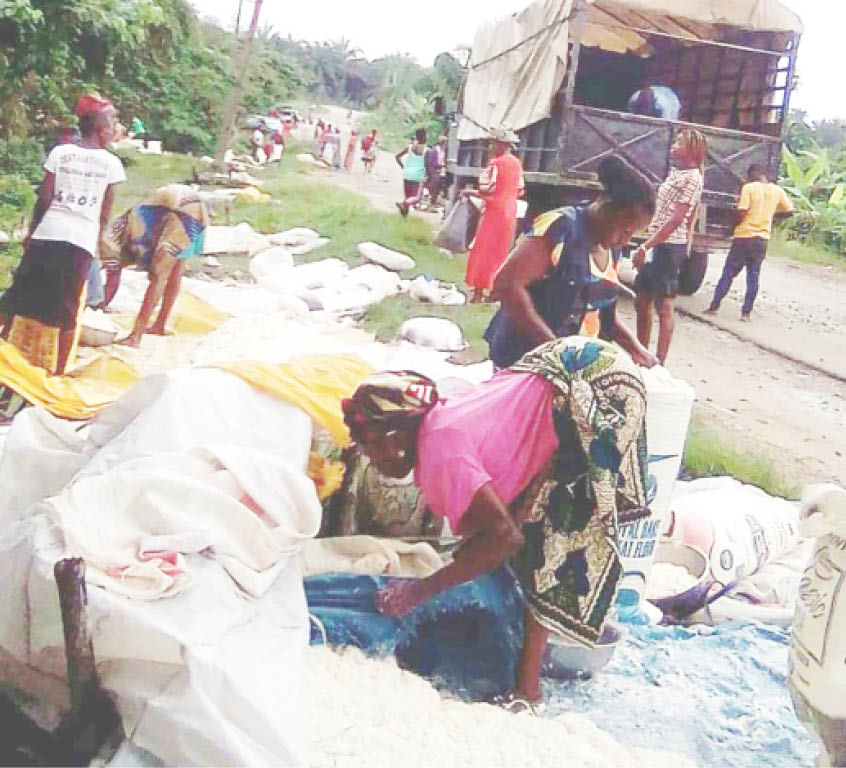Madam Affiong Robert looks over 70 but she is actually under 60 years of age. The grandmother of three from Ikono Local Government Area of Akwa Ibom State has lived in Okoyong, an historical community of Cross River State since she was in her 20s.
She has engaged in farming activities since then, including being hired at small fees to weed farms, cultivate or harvest cassava, even as she too owns her own farms and hires colleagues to help out sometimes.
Farmers, entrepreneurs, tech developers explore annual Agric Show to address challenges
Agric minister seeks collaboration on agroecology
Perhaps, due to tiresome manual works on farms on a daily basis, year in year out, Madam Robert has become bony, sickly and aged. She would not allow her picture to be taken despite pleas, arguing that she is not the head of the women cassava sellers and her portrait could offend the eyes.
“Our women have refused to come together so that we can unite for a common front. They argue that each of them has farms, so they do not see any reason to come together. So we do not have leaders.
“What we do is that every Friday, once it is the turn of the Okoyong Usang community, we converge on this junction market with quantities of our processed cassava. We are very many. As you can see, we usually spread along this road. Each one of us has the right to sell. But the prices for our processed cassava per bag fluctuate between N11,000 and N12,000 on the average as against N8,000 before now.
She said almost all of them that come with whatever quantities hardly returned with their goods because there are usually ready buyers who mostly come with medium sized trucks every week.
But why do buyers troop in their numbers from Akwa Ibom State, where cassava is grown in almost all the local government areas since it is their staple food? Affiong said the quantity of cassava produced in that state is not sufficient for their huge population and cannot be compared with the amounts produced in Cross River State.
According to her, the state has more lands and is the largest producer and supplier of cassava, which reason Nigeria is ranked number one producer in Africa.
“There are no more lands in Akwa Ibom State for massive cassava cultivation as we have here in Cross River.
Ready buyers
No fewer than 12 trucks loaded with 35kg bags of grounded cassava, which are ready to be processed into fufu or fried into garri, leave Atan Okoyong or Okoyong-Usang Abasi every Friday of the month. Each truck loads up to 50 or more bags, depending on their sizes.
These trucks are hired by big time off-takers to buy the processed cassava in bulk at cheaper costs and resell or further process it for the array of byproducts to sell at much higher rates outside the state.
At these local communities, a 35kg bag of grounded or processed cassava goes for either N11,000 or N12,000. When the buyers move into Akwa Ibom, where they are mostly resold, it goes for between N17,000 and N19,000, findings have confirmed.
It would mean that if 50 bags are sold at N12,000, then as much as N600,000 is generated by the women per week. Or put averagely, at N11,000, times 30 bags, N330,000 is generated. When it is multiplied by 12 months, one would marvel at how much a subsector like that can rake in within a small community.
A close look at other cassava-producing local government areas like Biase, Akamkpa, Akpabuyo and Obubra would show that if a proper attention is given to cassava in the state, it could boost both the farmers’ and state’s economies.
However, it is an infinitesimal sum from this amount that actually returns to the women, who toil, become skinny and age speedily as a result of the energy they put into the cassava cultivation and business all-year-round.
Huge labour costs
The women will have to pay the young men they hire to till the ground for cultivation of the crop, which is all season.
They also pay for the evacuation of the harvested cassava to the roadsides, where okada riders will charge them heavily to move to their houses or where to peel them. And they will pay those that will grind after it must have been soaked to ferment before frying it into garri.
To bag the processed cassava, either as garri or fufu, they will pay. They will further pay to be moved to selling points. So you notice that the N12,000 per bag does not really compensate them for the heat and heavy stress they take, as well as the drugs they buy to help themselves. It is rather the off-takers and middlemen that enjoy the profits.
Affiong said, “In Odukpani and nearby Akpabuyo local government areas alone, there are hectares of land available for cultivation. Besides, we process cassava for commercial purposes. Most people here are either cassava or palm fruit farmers.”
Factory needed
She said that due to the volume of cultivation and procession of the crop, it was important for the government to come in and support them to establish a cassava processing factory in Odukpani to reduce their stress in terms of cost, time and strains.
“We need the state government to help us establish a fufu factory so that we can all bring our cassava to process, even at a cost. We are suffering too much. Our husbands own farms but it is the women who would till the ground and do the cultivation in a crude way. But when we sell, we take the money to our husbands to appropriate.
“Looking at me you would think I am very old. It is because of daily toils on cassava farms. I do hired jobs on farms for people. Many of us do that, although we also own farms.
“We do not make much profit because we pay young men to help us do cultivation, harvest, evacuate and lift heavy bags. All the labour costs impact against what would have been our profit,” she said.
Corroborating Affiong’s explanation, a community leader and cassava grower in the state, Chief Ekpe Effiom said, “Odukpani is not the only local government area reputed to cultivate and process cassava. Akamkpa and Akpabuyo in the southern district also have massive farm settlements owned by elderly peasant farmers, mostly women. Obubra and Yakurr are more famous as they seem to have the largest cassava plantations in the state. It is the women that mostly toil day and night to cultivate these cassava farms, to the points of processing and selling.
“They tend and do the weeding manually or use herbicides, which they complain are high in cost and pose dangers to crops.’’
Another elderly woman in the Ikot Esu farming settlement, near Creek Town in Odukpani, popularly called Eka Mercy, originally from Etinan Local Government Area in Akwa Ibom State, has spent over 45 years in that community with her husband, popularly called Akpan Mbioto, cultivating cassava all-year-round.
Eka Mercy, who looks very frail and bony, soaks cassava in big drums for fermentation. She also grinds and ties heavy woods together, a form of local technology that squeezes water from the bags of grounded cassava.
Her children are all married and staying in urban centres, so none of them is available to render help. Her only son lives in Calabar and crosses the river regularly to take garri and other foodstuff after his mother would have toiled to produce them.
“After all the long and tedious processes, I would pay boys to convey the bags to the Creek Town beach, from where speed boats would evacuate them early Thursday morning to Obio Oko beach in the Marina area of Calabar. We usually sleep over at the beach until Thursday morning, which is usually a big market day there.
“When I come to Calabar beach with, say five 10kg bags, I do sell them all, sometimes at N3,500 or N4,000 per bag. But these amounts are not commensurate with the stress involved,” she said.
The chairman of Cassava Growers Association in the state, which has over 5,000 members, Venerable Augustine Oqua, said that in order to reduce the primitive and stressful method of cassava cultivation and procession, farmers and the government should think of mechanisation.
“We do not have enough mechanisation; all we see are peasant farmers who do manual works. The number of those that cultivate cassava and produce its byproducts is grossly inadequate to feed the staggering population of consumers in the state and the country. We need the government to open up land for cassava growers. We need to graduate to mechanisation.
“The issue of tractors is also important. We do not have enough tractors in the state. I doubt that we have up to three tractors that are functional. Cassava production needs lots of technical know-how. We need to support individual farmers with inputs and fertiliser to boost production,” he said.
He expressed happiness that the state government had given support to cassava farmers by establishing a processing plant in the Obubra area, although far away from Odukpani, another epicentre of cassava production.
Oqua said the plant would gulp as much as 240 metric tonnes, amounting to 12 trailer-loads of cassava per day. But the challenge of feeding the plant per day is huge
He recommended that more lands be opened up to cultivate cassava flour to feed the plant so that they could sell the finished products to off-takers.
Addressing the plight of the women recently, Governor Ben Ayade explained that his government had established a multi-million naira cassava processing plant in Obubra to increase economic output and reduce the strains of smallholder farmers in the state.
He said the plant would enable the women and others to make greater gains from cassava byproducts, such as garri and starch.
Ayade explained that the choice of Obubra was because they produced the largest quantity of the crop in the state.
He said the factory had the capacity to produce commercial starch and modified flour from the crop.



